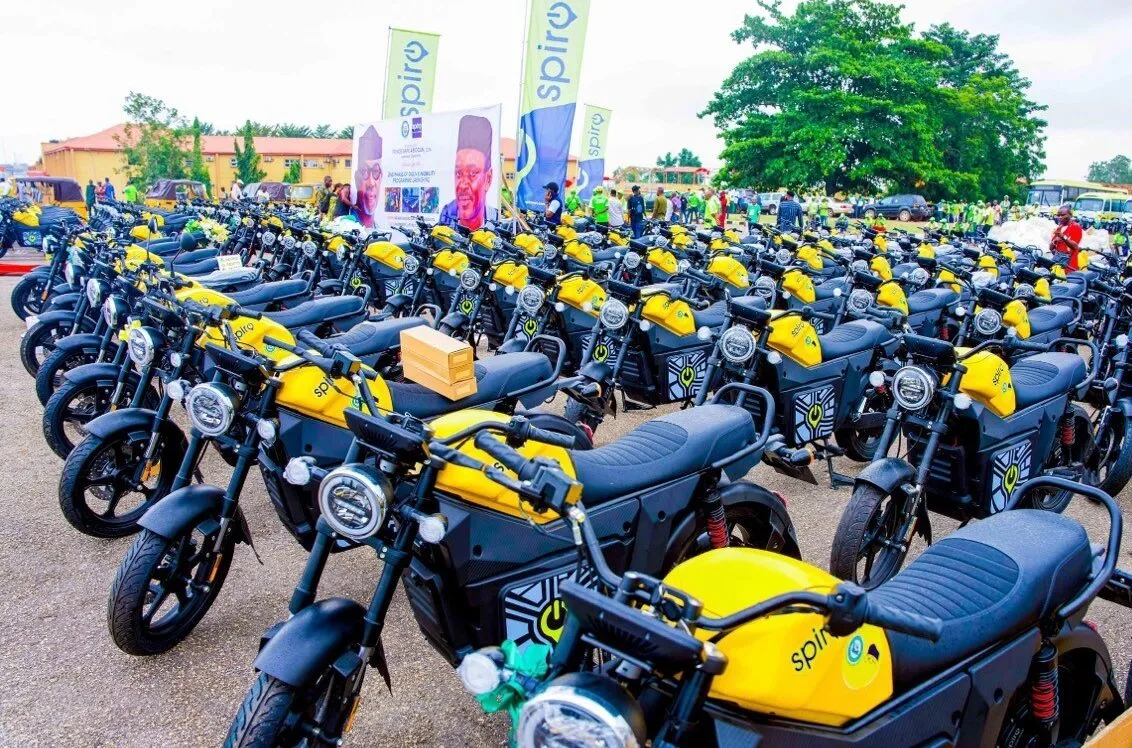Spiro and the Future of African E-Mobility: The Startup That Became the Continent's Most Powerful EV

The landscape of mobility in Africa is changing, and it is doing so in very practical and inevitable ways. Right at the heart of this mobility shift is Spiro, a company that started out as a small ambitious player and has grown in record time into one of the most influential forces on the continent in electric transportation.
Unlike many African tech stories that lean heavily on hope and hype, the rise of Spiro is underpinned by infrastructure, funding, and clear economic logic. It isn't selling aspiration; it's building systems. And those systems are starting to redefine what transportation can mean for African cities, workers, and governments.
The subtle premise goes this way: with African cities mostly using motorbikes for daily transport, and with increasing fuel and maintenance costs, an electric alternative, cheaper to operate and easier to maintain, is not only attractive but inevitable. This is the context in which Spiro has evolved from a startup into a continental powerhouse. And the developments propelling it upwards reveal a company thinking far beyond the typical tech playbook.
Groundbreaking Funding that Altered the Narrative
One of the clearest markers of Spiro's influence came when the Africa Export-Import Bank, through its investment arm FEDA, led a hundred-million-dollar investment round into the company. For Africa's e-mobility space, this was the largest deal of its kind. Still, the symbolism behind the funding was even more important: the point at which major institutional investors stopped treating electric mobility as some kind of foreign experiment and started treating it like an African economic opportunity.
Beyond validation of the Spiro business model, the investment provided the financial backbone that will ensure infrastructure development at an accelerated pace. E-mobility on the continent requires the availability of a charging or swapping station. Without the availability of the same, slow adoption and a poor user experience are seen. With the new funding, Spiro began focusing intensely on scaling up this network so that riders wouldn't have to think about how many hours they would spend waiting for their motorcycles to charge. A rider can just roll in, exchange a depleted battery for a fully charged one, and continue with his day.

That single shift changed the psychology of adoption. Riders who rely on their motorbikes for daily income cannot afford any downtime. Spiro's model respects that reality. And the funding allowed the company to scale that model fast enough to keep up with rising demand.
It also opened doors for job creation-not as some vague promise, but as a measurable outcome. As Spiro scales across the continent, it needs engineers, assembly workers, technicians, station operators, supervisors, and data specialists. These are jobs that anchor a new industrial sector, not just a technologically interesting one.
Fast, Focused, and Continental Expansion
Spiro's pan-African expansion has been unusually bold for a private company in the transportation sector. For decades, traditional automakers have debated how to tackle African markets, often moving very slowly, piloting small projects, or confining themselves to major urban areas. Spiro entered the same terrain with a different mindset-scale first, then refine while scaling, moving toward underserved high-traffic regions rather than waiting for perfect conditions.
By 2025, it wants over a hundred thousand e-motorbikes on African roads, almost double what it currently operates. The growth is not about flooding the market with vehicles; it is about developing a networked ecosystem: bikes, stations, repairs, financing options, digital infrastructure, and partnership frameworks that will keep the entire system functional.
The core of this strategy is the battery-swapping network. The company has just passed twelve hundred stations and is pushing for over three thousand. This will position Spiro as the first e-mobility company in Africa to have a truly functional citywide and cross-country infrastructure model. In places like Benin, Rwanda, and Kenya, the visibility of these stations has already begun shifting public perception-electric mobility is no longer a concept of the future; it's a day-to-day reality.
Latest Tech News
Decode Africa's Digital Transformation
From Startups to Fintech Hubs - We Cover It All.
Spiro is now present in several countries, including Kenya, Nigeria, Benin, Togo, Rwanda, and Uganda. Pilot programs up and running in Cameroon and Tanzania point to a deliberate play for regional dominance before global players even start their salvo of bids for African market share. In markets where motorbikes carry cities as commercial riders, delivery operators, and everyday commuters. The strategy at Spiro is simple and efficient; make the electric option more reliable, more affordable, and more convenient than fuel-powered options.
Manufacturing Strategy for African Realities
A major turning point in Spiro's evolution has been its move toward African assembly and manufacturing. This contrasts sharply with most global EV producers, which often limit their presence in developing markets to imports and distribution.
Spiro's model is premised on the understanding that local manufacturing reduces import costs, improves supply chain resilience, and creates industrial jobs. By establishing facilities within the continent, Spiro is not only making the products more affordable but also setting the stage for Africa to be a participant in the global EV economy, rather than just a consumer at the tail end of the chain.
Kenya already hosts one of Spiro's operational assembly plants. The facility in Ogun State, Nigeria, is underway and is expected to support large-scale assembly for West Africa. Planned facilities in Rwanda and Uganda extend the vision even more, with planned maintenance hubs, production areas, and training centers that will support thousands of local workers.
This is particularly important because African EV adoption will not be sustained by imports alone; domestic technical capacity, accessible parts, and a workforce trained to maintain and innovate within the ecosystem are vital. Spiro’s decision to localize production thus indicates that the company understands the long-term economics of the continent better than many of its foreign players, who have so far treated Africa as a passive market.
Partnerships that Anchor Influence, Not Just Visibility
A defining element in Spiro's growth is the strategic approach to partnerships. Without relying on government endorsement or traditional corporate alliances, it has forged relationships that bridge culture, technology, and sustainability.
One example is its collaboration with the global music icon Davido. While celebrity partnerships are not anything new in marketing, the purpose of this one is different. Davido's presence helps position electric motorbikes as part of contemporary African lifestyle and culture, not just a utilitarian tool for commercial riders. When a form of transportation becomes aspirational, adoption broadens. Spiro understands this psychological shift.

The company's partnership with Ace Green Recycling addresses one of the most critical environmental questions about EVs: what happens to batteries at the end of their life cycle?
Even highly industrialized countries have struggled to establish sustainable systems for battery recycling. By addressing this challenge now, Spiro is setting a benchmark for responsible e-mobility growth on the continent. Batteries are tracked, repurposed, and processed through circular systems that prevent toxic waste and extend material value. It's a model that aligns with global sustainability concerns while reflecting African environmental priorities.
On the digital front, Spiro has invested in building a technology layer that enhances safety, efficiency, and transparency. Riders and fleet operators alike benefit from telematics tracking performance, monitoring vehicle health, and predicting maintenance needs before breakdowns occur. Payment systems are integrated into the digital experience, letting riders manage swaps and services seamlessly.
Spiro is no longer a company selling motorbikes; it's building an ecosystem in mobility tech that stands at the crossroads of transport, data, energy, and industrial development.
Latest Tech News
Decode Africa's Digital Transformation
From Startups to Fintech Hubs - We Cover It All.
What Spiro Represents In The Larger African Mobility Story
The impact of Spiro's growth goes much further than its own enterprise. The company is symbolic of a structural shift in how African cities could move into the future. Cleaner air can be achieved when tens of thousands of petrol-powered motorbikes are replaced with electric alternatives. Transport becomes more affordable when riders no longer depend on unpredictable fuel prices. Employment expands when manufacturing, repair services, and infrastructure management take root across multiple countries.
Spiro's success also plays a subtle but important role in investor psychology. For too long, African mobility has been seen through the prism of risk. Large, transformative investments have flowed into fintech and telecommunications, while transportation remains underfunded. Spiro's funding round breaks that pattern. It signals that African mobility-if approached with infrastructure-driven logic-is viable, scalable, and worthy of institutional investment.
Importantly, Spiro represents a uniquely African model of e-mobility with it being decentralized, affordable, adapted to both informal and formal transport systems, and built around the realities of African riders and roads. It is not a copy of any Western EV strategy, nor does it depend on conditions unavailable in African cities. It is a homegrown model built to thrive in African environments.
What Spiro achieves today is a watermark in the transportation story of the continent. This company does not wait for global trends to tell it what to do; it builds its future from within through local assembly, aggressive expansion, strategic partnership, and grounding its operations in the daily needs of African riders. It is, in many ways, the most relatable example of what this transition towards EVs will look like when designed for Africa, not adapted to it. And perhaps that is Spiro's greatest accomplishment.
It has made electric mobility feel less like a distant global movement and more like an African-led transformation. The kind that reshapes economies, empowers workers, and sets a foundation for cities that move cleaner, faster, and more affordably than ever before.
You may also like...
When Sacred Calendars Align: What a Rare Religious Overlap Can Teach Us

As Lent, Ramadan, and the Lunar calendar converge in February 2026, this short piece explores religious tolerance, commu...
Arsenal Under Fire: Arteta Defiantly Rejects 'Bottlers' Label Amid Title Race Nerves!

Mikel Arteta vehemently denies accusations of Arsenal being "bottlers" following a stumble against Wolves, which handed ...
Sensational Transfer Buzz: Casemiro Linked with Messi or Ronaldo Reunion Post-Man Utd Exit!

The latest transfer window sees major shifts as Manchester United's Casemiro draws interest from Inter Miami and Al Nass...
WBD Deal Heats Up: Netflix Co-CEO Fights for Takeover Amid DOJ Approval Claims!

Netflix co-CEO Ted Sarandos is vigorously advocating for the company's $83 billion acquisition of Warner Bros. Discovery...
KPop Demon Hunters' Stars and Songwriters Celebrate Lunar New Year Success!

Brooks Brothers and Gold House celebrated Lunar New Year with a celebrity-filled dinner in Beverly Hills, featuring rema...
Life-Saving Breakthrough: New US-Backed HIV Injection to Reach Thousands in Zimbabwe

The United States is backing a new twice-yearly HIV prevention injection, lenacapavir (LEN), for 271,000 people in Zimba...
OpenAI's Moral Crossroads: Nearly Tipped Off Police About School Shooter Threat Months Ago
ChatGPT-maker OpenAI disclosed it had identified Jesse Van Rootselaar's account for violent activities last year, prior ...
MTN Nigeria's Market Soars: Stock Hits Record High Post $6.2B Deal

MTN Nigeria's shares surged to a record high following MTN Group's $6.2 billion acquisition of IHS Towers. This strategi...
